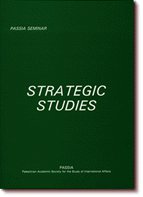Strategic Studies
Strategic Studies was the subject addressed in PASSIA's second seminar to train Palestinian graduates in the field of international affairs. The report contains the proceedings of the seminar including summaries of all lectures. The appendices document the course material, assignments and notes on the visiting lecturers and participants.
Overview
The PASSIA special committee for this seminar consisted of : Dr. Ibrahim Abu Lughod - Head of Department of Political Science at Northwestern University, USA; Vice-President of BirZeit University. Dr. Khalil Shikaki - Professor in the Department of Political Science at An-Najah National University in Nablus; Director of Centre for Palestine Research and Studies - Nablus. Ms. Alison Brown - Seminar Co-ordinator and Rapporteur; PASSIA. Dr. Mahdi Abdul Hadi - President and Founder of PASSIA. PASSIA consulted with British and Palestinian scholars in the field of Strategic Studies and Security on sharing the implementation of the seminar. During December and January, PASSIA prepared reading material for the course. PASSIA advertised the proposed seminar in the local press, Al Quds and Al Fajr English, and through national institutions such as universities and research centres. PASSIA received 40 applications from all over the Occupied Territories.
The Committee invited all applicants to individual interviews at PASSIA between 18th and 20th March 1993. Of the thirty applicants who attended interviews, the Committees selected fifteen to participate in the seminar and three reserves.
The Committee recommended that PASSIA hold another seminar in Arabic. PASSIA will invite the majority of those not selected for the April 1993 course to participate in this seminar.
This seminar took place from the 19th-30th of April and the following accepted the PASSIA invitation to be guest lecturers:
Dr. Rosemary Hollis - Research Fellow and Head of the Regional Security Programme at the Royal United Services Institute for Defence Studies in London. Ms. Valerie Yorke - Middle East Editor at the Economist Intelligence Unit, London. Dr. Ibrahim Abu Lughod - Head of Department of Political Science at Northwestern University, USA; Vice President of BirZeit University. Dr. Khalil Shikaki - Assistant Professor in the Department of Political Science at An-Najah National University, Nablus. Director of Centre for Palestine Research and Studies.
The British guests and the Palestinian academics ran the seminars as a team, with the exception of Professor Trevor Taylor - Head of the International Security Programme of the Royal Institute of International Affairs, London, who unfortunately declined to attend the seminar at the last minute. The intensive programme of lectures and workshops was held over a two week period from the 19th to 30th of April.
II. Introductory addresses
Dr. Mahdi Abdul Hadi and Dr. Ibrahim Abu Lughod
Dr. Mahdi Abdul Hadi addressed current political developments saying that since Madrid two documents have been produced, the Israeli plan entitled "Autonomy" and the Palestinian "PISGA" (Palestinian Interim Self-Government Authority). Added to this are the multilateral talks on the issues of the economy, water, environment, disarmament and security, and human rights. Another factor is in the domestic arena and the importance of going beyond the settling of internal disputes and preparing for exercising national authority on the ground. He noted that much of the structure and consensus needed for this kind of movement was already in place with a clear mandate from the leadership in Tunis, higher councils established on a professional basis and covering fields such as education, housing, industry, planning, and in the future, health and other issues. He stressed the need for a national system and a central authority to govern the society. He went on to talk about the question of borders and after a brief historical overview noted that when considering the question of borders in the transitional phase there had been semi-internationally recognised boundaries since the Sykes-Picot agreement of 1916 and priority should be given to determining exactly which territory is being discussed before setting a political arrangement and not vice versa.
Dr. Abu Lughod addressed security issues such as the protection of national interest and said that Palestinians prefer to give attention to how security can be achieved through the rule of law and equality among nations rather than the balance of power and the threat of war. He defined the state in terms of national identity, territory and representation by national consensus. He considered the final factor to be sovereignty over land and concluded that it was only this factor that the Palestinians did not yet have. An important aspect is the attention to political and national rights and the central problem is how the Palestinians are to protect themselves as a people and a state. He noted that in 1974 Arafat re-opened the Palestinian question and the vision of a democratic secular state with a strategy of clarity about political goals, attention to individual rights, national liberation consistent with international legitimacy and organising people, especially in the Diaspora, to revive national identity. Israel lost its moral authority during the intifada by fighting unarmed women and children while the political goal of a state in the West Bank and Gaza for all the Palestinian people was pursued by political means. Professor Lughod added that states come into being in two ways, by the use of force or by agreement and while Israel can perpetuate occupation by military means, it cannot impose its will to bring surrender. There must therefore be a mutual political solution.

